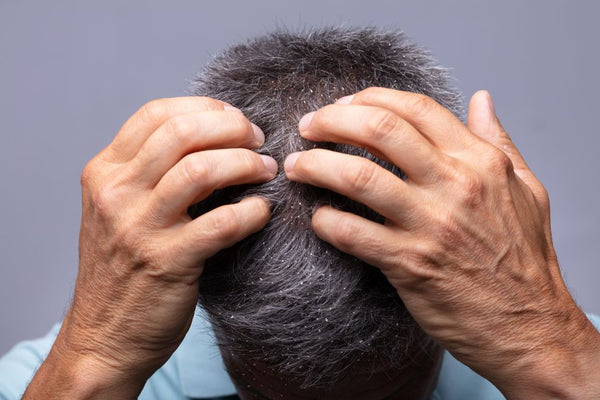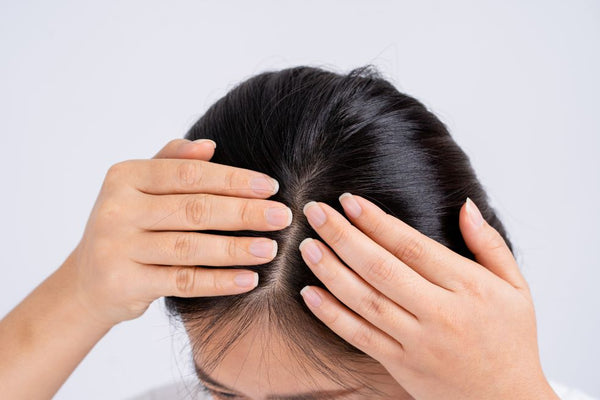Hair loss is a common concern for most people, often leading to inquiries about its causes and potential remedies. Among many questions, one of the most prevailing questions is, "Can A Dry Scalp Cause Hair Loss?" To address this question, it’s vital to unravel the detailed connection between scalp health and hair loss.
A dry scalp manifests through symptoms like persistent itchiness, flakiness, and lack of moisture. Also several factors can contribute to this condition which includes harsh weather conditions, frequent shampooing, underlying skin conditions such as psoriasis or eczema, and even certain hair care products that can strip the natural oils from the scalp. It is essential to identify these symptoms and understand the root causes of dry scalp in order to manage the condition effectively.
Connection Between Dry Scalp and Hair Loss
A dry scalp might not be the direct cause of hair loss. Excessive dryness can weaken the hair follicles, making them more susceptible to damage and breakage. If you neglect a dry scalp for a long time, it might eventually impact the overall health and strength of the hair strands. And as a result, the compromised scalp condition could lead to issues like dandruff or seborrheic dermatitis which can further exacerbate hair loss concerns.
There are misconceptions abound regarding the correlation between a dry scalp and hair loss. Contrary to popular belief, a dry scalp itself might not directly cause hair loss; however, the conditions associated with it, like itching or inflammation, can contribute to hair damage and subsequent loss. That’s why it is necessary to dispel such myths and emphasize the importance of holistic scalp care for healthy hair.
You might be also interested in how scalp inflammation cause hair loss.
Dry Scalp and Dandruff

Often, dry scalp and dandruff are confused as the same thing, and while both can cause visible flakiness, there are subtle differences. A dry scalp occurs when the scalp doesn't have enough moisture resulting dryness, itchiness, and small white flakes. Many factors can contribute to a dry scalp which includes environmental factors, dehydration, over-washing with harsh shampoos, or skin conditions like eczema or psoriasis.
Dandruff is often linked to a yeast-like fungus called Malassezia that lives on the scalp. When it grows excessively, it can irritate the scalp, causing it to shed skin cells at a faster rate, leading to larger, oily, yellow or white flakes. Dandruff flakes are usually larger, oilier, and can be yellowish in color. Scalp may feel oily or greasy, while the flakes might stick to the scalp and hair strands. Hormonal changes, stress, certain skin conditions, or overproduction of sebum (skin oil) can also contribute to dandruff.
Can Dry Scalp Really Cause Hair Loss?
A dry scalp itself typically doesn’t cause hair loss. However, if it is left untreated, can cause severe dryness and can lead to scalp itching and scratching, which can damage the hair follicles or cause temporary hair loss. Additionally, conditions like dandruff or seborrheic dermatitis, which often accompany dry scalp, might contribute to hair loss if they’re chronic and lead to inflammation or excessive scratching.
Scalp Conditions That Can Cause Dry Scalp and Hair Loss
Some scalp conditions can also cause dry scalp and hair loss. Some of these conditions include:
Seborrheic Dermatitis: Seborrheic Dermatitis is a scalp condition that can lead to dry scalp and hair loss. It is a common skin condition that is characterized by red, itchy, and flaky skin. It can lead to both hair dryness and excessive oiliness which results in temporary hair loss.
Psoriasis: It is a chronic skin condition that affect the scalp causing red, scaly patches. This can lead dryness, itching, and in severe cases, hair loss.
Folliculitis: It is a condition that occurs when hair follicles become inflamed due to bacterial or fungal infections. This can cause dry scalp, itching, and in severe cases, hair loss.
Alopecia Areata: It is an autoimmune condition which causes hair loss in patches. While the scalp might be dry per se, the areas affected may experience dryness due to lack of hair cover.
Hypothyroidism: Hypothyroidism is a medical condition where the thyroid gland does not produce enough hormones. One of the effects of this hormone imbalance can be a flaky, dry scalp and hair loss. The lack of thyroid hormones can make the scalp very dry and irritated, leading to dandruff-like flakes. Hypothyroidism can also cause the hair to become thin and brittle, resulting in excessive shedding or patchy hair loss over time.
Chemical Damage: Excessive use of harsh hair products or frequent chemical treatments can lead to a dry, irritated scalp and eventual hair loss.
How to Treat Dry Scalp and Hair Loss?
Maintaining scalp moisture is essential for healthy hair and preventing dryness. Here are some dry scalp remedies you can try at home:

Use a gentle shampoo: A gentle, moisturizing shampoo is one way to help treat a flaky, dry scalp and hair loss. Don't use shampoos with harmful ingredients. Use mild, sulfate-free shampoos that don’t strip away natural oils. Consider medicated shampoos with moisturizing ingredients like aloe vera, coconut oil, or shea butter.
Limit washing frequency: Washing too frequently can strip the scalp of its natural oils. Try to wash your hair every 2-3 days or as needed to avoid excessive dryness.
Condition regularly: Use a hydrating conditioner after shampooing to restore moisture to your hair and scalp. Focus on applying it to the ends and mid-lengths of your hair, as well as the scalp, if it tends to be dry.
Avoid hot water: Washing your hair with hot water can dehydrate the scalp. Use lukewarm or cool water instead, as it’s gentler on the scalp and helps retain moisture.
Scalp messages: Gently massage your scalp with your fingertips can stimulate blood flow and help distribute natural oils, promoting scalp health and moisture.
Use a humidifier: In dry environments or during the winter months when indoor heating can dry out the air, using a humidifier can help add moisture to the air, benefiting your scalp and hair.
Choosing moisturizing hair products: Look for leave-in conditioners, oils, or serums specifically formulated to hydrate the scalp and hair without weighing it down.
Protect your scalp from the sun: Just like protecting your skin, consider wearing a hat or using sunscreen on your scalp when exposed to the sun for extended periods to prevent dryness and potential damage.
Stay hydrated: Drinking enough water helps maintain overall hydration levels in your body, including your scalp.
Also Read: Why does a shiny scalp look shiny?
Theradome: Dry Scalp and Hair Loss
Theradome is a laser hair growth helmet designed to stimulate hair growth. It uses LLLT technology to promote hair regrowth in individuals experiencing hair loss potentially.
Theradome helmet itself doesn’t directly target dry scalp to stimulate hair follicles and encourage hair growth. However, using a Theradome helmet in conjunction with other hair loss treatments can support the effectiveness of the device by creating a healthier environment for hair follicles.
When using Theradome or any hair growth treatment, it is essential to address any underlying scalp issues like dryness and dermatitis that might contribute to hair loss.






















